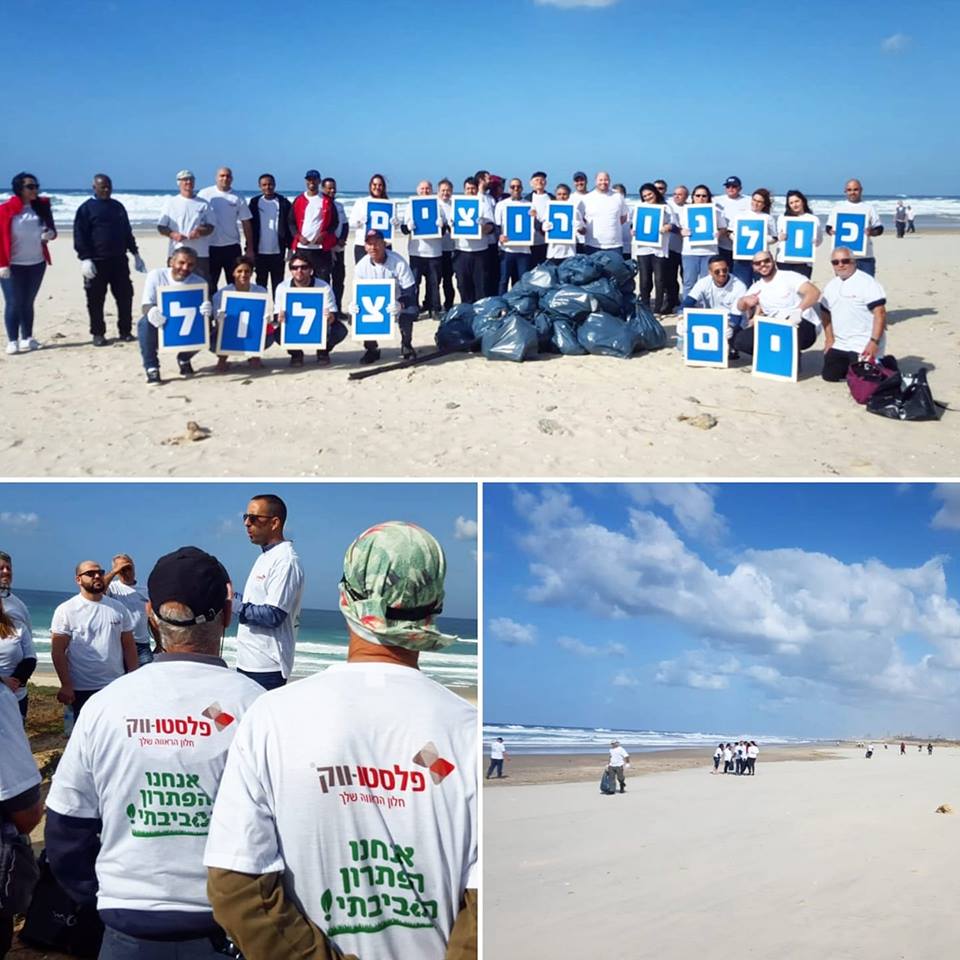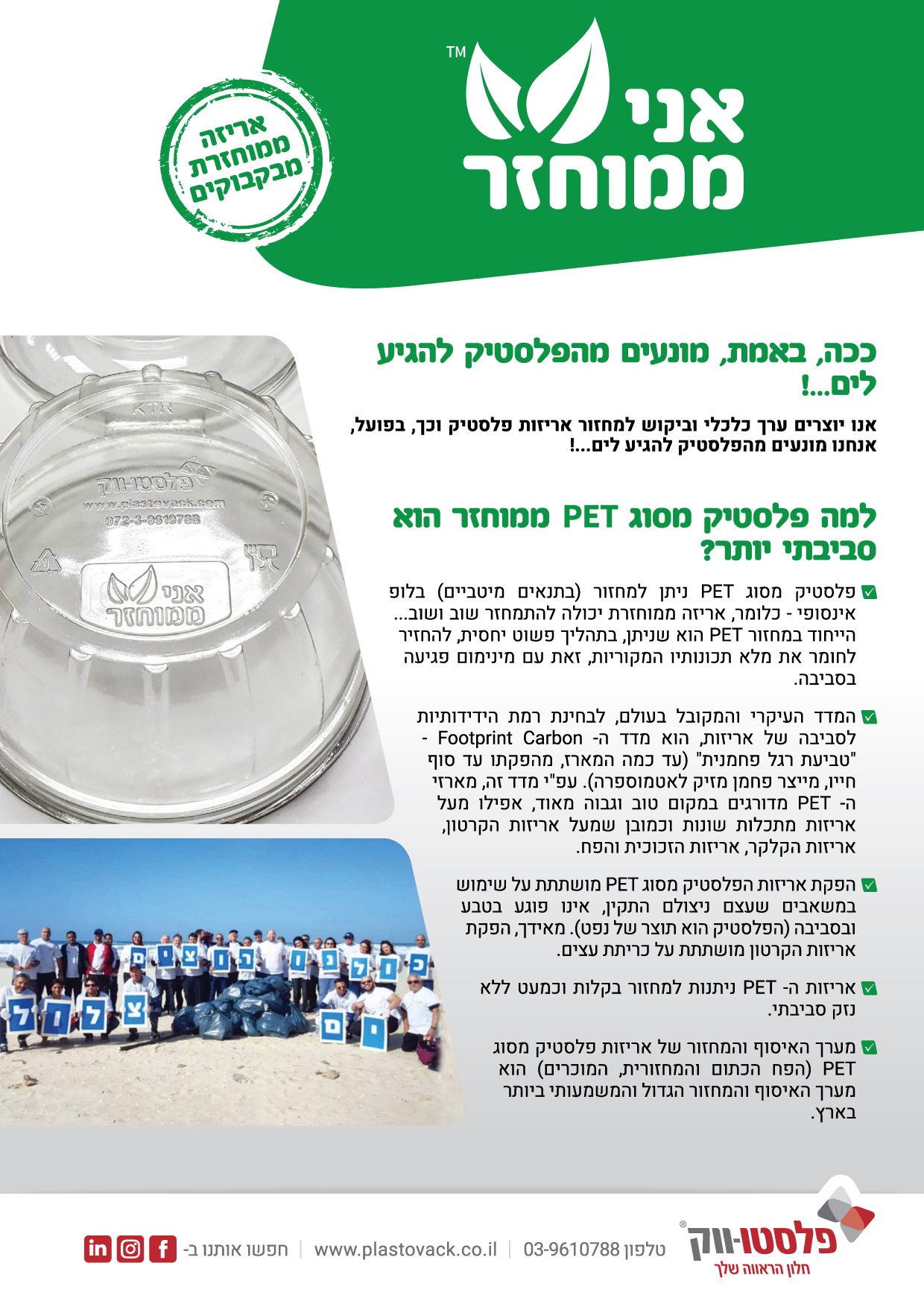Recycling and environmental protection
We are the environmentally friendly solution!
About 97% of the packaging Plasto-Vack manufactures is made from recycled materials (per standards, high quality, and certified for contact with food). The materials are collected from different sources, including recycled bottles from collection points, such as the orange bins for recycling plastic. In this way, Plasto-Vack contributes significantly to environmental protection, is active in solving the plastics problem, and supports the creation of the green circular economy.
70-78% of the company’s packaging is recycled through 80% combined cycle*. Other packaging is 30-40% combined cycle*. Information about the recyclable percentage of specific products is stated in the product specifications, which are provided to customers on demand).
* Combined cycle is post-consumer recycling of bottles from Israel and overseas plus internal recycling by Israeli and foreign companies that has undergone further processing to turn it into raw material.
In practice, we prevent plastic entering the oceans!
For further information about the importance of recycling, please continue reading the article or click the following links:

Picture above: “I am recycled” – our environmental logo marking recycled packages. Look for it.

Picture above: Plasto-Vack employees picking up garbage at Palmachim Beach in cooperation with Zalul, an environmental organization dedicated to protecting Israel’s seas and streams.
Is PET plastic more environmentally friendly?
Why Polyethylene Terephthalate (PET), a class 1 recyclable plastic packaging material, (Plasto-Vack uses it as the primary material in the manufacturing process) is more environmentally friendly than other options on the market:
- The main, and most important, index accepted in the world for reviewing the level of environmental friendliness of different kinds of packaging is its carbon footprint – the amount of carbon dioxide produced during the manufacture of the packaging through its delivery to the customer. PET packaging has a high rating in this index, even higher than degradable packaging, not to mention cardboard, Styrofoam, glass, and metal.
- PET plastic packaging is based on the use of resources that, if properly used, do not harm nature and the environment (plastic is produced from oil). Conversely, the production of cardboard is based on the use of the critical natural resources, which is very harmful to the environment, as it is produced from trees.
- PET packaging can be easily recycled without harming the environment. Therefore, encouraging and emphasizing the importance of recycling by writing about it on your label can help.
- PET plastic collection and recycling (at the collection points we are all familiar with) is the largest and most important recycling network in Israel.
- Recycling is currently the best solution for the environment.
Why is degradable packaging less environmentally friendly and even more harmful to the environment?
- Let us clearly state that we are not talking about packaging that decomposes in compost and conforms to ISO 13432 – Compostable Packaging. There are many materials with the “degradable” title, that are not actually degradable packaging for other reasons (such as BIO and OXO). Europe recently banned the use of degradable OXO materials.
- Compostable packaging is usually suitable for industrial composting (not ordinary or household compost). Israel has no industrial composting plant, which means that this method is inapplicable here.
- Even when there is such a facility, most packaging is not composted, because of the sorting at the entry to the facility. Any product that looks like ordinary plastic is removed and is not composted in order to avoid harming the quality of the producer’s compost product.
- Furthermore, if degradable packaging, i.e. made of organic materials, such as corn or soy beans, fully replaces plastic, the current crop fields are not sufficient, and it will be necessary to uproot hundreds of thousands of hectares of forest, if not more, to meet the huge demand – causing far greater environmental harm!
- Moreover, fields of crops in general, and crops for degradable packaging in particular, are frequently ploughed – and ploughing the soil releases greenhouse gases into the atmosphere resulting in global warming, the key environmental problem today.
- Biodegradable material still includes chemicals that may be released into food. If the packaging is compostable, it releases toxic materials into the environment and food. The contact of biodegradable plastic with food can poison users, in contrast to the use of non-biodegradable plastic. The reason is that biodegradable plastic is supposed to break down under conditions of heat and humidity, which often happens with food during transportation and storage, resulting in the presence of particles of these materials in the food.
On a personal note, about ten years ago, Plasto-Vack was a pioneer in the use of degradable packaging, switching to PLA material made from corn. But when we realized that it was not environmentally friendly, and more broadly speaking, even harmful, we stopped using it and began using recycled materials.
Source (click on the link): Biodegradable plastic could actually increase sea pollution, Biodegradable plastic – is really more eco-friendly, Scientists dig biodegradable bags after 3 years
Click here for a video from Channel Kan 11 on the subject
Other work we do to promote our eco-friendly philosophy
At Plasto-Vack, we are aware of the importance and impact the environment has on our lives. We are therefore committed to consistently striving towards greener production, both in terms of the manufacturing process, company operations and the final packaging.
- We work with recyclable materials and produce packaging that can be recycled at centers around the country. Recycling our packaging is an easy, effective, and optimal eco-friendly solution.
- We comply with environmental protection standards pursuant to Israeli law.
- We apply a recycling policy in the company’s daily operations – residual raw materials from production are recycled.
- The materials that undergo the manufacturing process and the products we produce conform to Israeli environmental protection standards.
- We constantly strive to improve environmental indices.
- We provide proper information and training for parties of interest (management, customers, employees, and the authorities).
- As part of our environmental/social responsibility, we contracted with Tamir Recycling Corporation, which is certified by the Ministry of Environmental Protection under the Regulation of Processing of Packaging Law, 5771—2011. The contract enables Plasto-Vack to reduce packaging waste that goes to landfills and encourages the reuse of packaging and achieve the recycling targets prescribed in Israel.
Did you know?
- Most plastic waste in the oceans comes from Third World countries where there is no recycling or even landfills for plastic. The norm there is to simply dump waste into the sea in various ways.
- Considerable cardboard packaging, especially in the food industry, has an internal plastic coating, and sometimes other layers as well, that greatly hinder or even prevent its recycling.
- There are other, non-PET, kinds of plastic that are difficult to recycle and harm the environment.

- We emphasize that Plasto-Vack offers other packaging that the company does not directly produce, and that this packaging, made by other manufacturers, does not conform to the company’s high sustainability and recycling standards.
- The information on this page is based on the experience and knowledge of Plasto-Vack’s managers, and includes extensive information from publications and research. We have provided links to some of them. This text was edited by Mr. Uzi Kelberman, an expert in plastics and recycling, who added notes and supplements. Mr. Kelberman, formerly the CEO of Aviv Recycling Industries, is currently a packaging consultant.